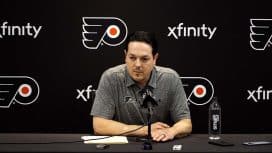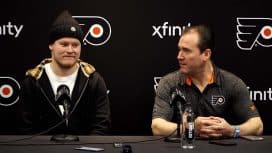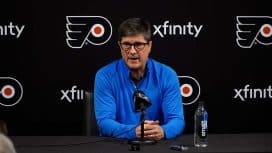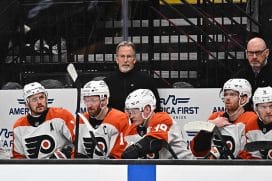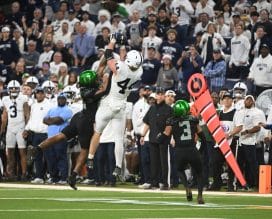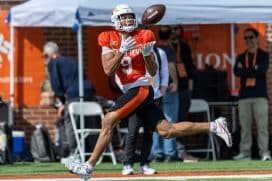Flyers
Flyers at 50: The Red Army Game
It was 41 years ago today that one of the lasting memories in Flyers history took place.
The "Red Army Game" as it has come to be known put the Broad Street Bullies against the best hockey team in the world in the Soviet Union on Jan. 11, 1976.
Our Mike Watson profiled the game in one of his weekly trips back into Flyers history a couple years ago. Here is that story:
"They are leaving…They are walking out," Marv Albert said.
…"And they’re taking their sticks with them," Gene Hart added.
Those words described one of the most bizarre reactions in history during an "exhibition" hockey game between the Soviet Red Army and the Philadelphia Flyers.
In 1975-76, the exhibition was called "The Super Series" and at a time where the Cold War was at its coldest and presented the opportunity to show North American hockey supremacy. The Soviets brought over two teams, the Soviet Red Army, winners of countless international awards and medals, and a talented but lesser squad, the Soviet Wings.
The Soviet Wings won three and lost one on this tour and played lesser NHL squads – Penguins, Sabres, Blackhawks and Islanders. However, the much-heralded Soviet Red Army was undefeated heading into the matchup with the Flyers.
They had beaten the Bruins, 5-2, and the Rangers, 7-3, while tying the Canadiens — the eventual 1976 Stanley Cup champions — 3-3 in what some would call one of the best hockey games ever played.
The NHL and the rest of the hockey world now pinned their hopes of a Soviet Red Army defeat on Philadelphia and the "Broad Street Bullies." The game was nationally televised on a Sunday afternoon in the US and Canada for everyone to see.
Although the Flyers were known for their physical play, head coach Fred Shero had also studied the Soviets game for years. He employed a defensive style for his Flyers in this game, keeping them to the perimeter and clogging up the neutral zone. When the Flyers challenged a Soviet player carrying the puck, they made sure he was hit. . This tactic worked for the first nine plus minutes as the game was scoreless.
As Flyer Ed Van Impe came out of the box from a penalty, the Red Army was entering the Flyers zone. Van Impe took aim on star Valeri Kharlamov at the left face-off circle. Just as Kharlamov took a pass, Van Impe cleaned his clock with a crushing shoulder-to-shoulder check that sent the Russian player sprawling to the ice and he laid there motionless. Play was stopped and Soviet coach Konstantin Lokev was enraged that there was no penalty called. After arguing through interpreters at the bench with the officials and being assessed a two minute delay of game penalty, Lokev pulled his players from the ice.
They left. The Soviets were quitting.
With 17,077 Flyers faithful booing this cowardly act, Flyers owner Ed Snider immediately went to the locker room area and met with NHL league officials and Soviet representatives. Snider was quick and blunt with his solution to resume play. "If they don’t come back out to play," Snider said, "they won’t get paid."
Apparently, that opened a few eyes in the bowels of the Spectrum. After roughly a 15-minute delay, probably to figure out how many Rubles they would be leaving behind, the Soviet Red Army caved in and headed back out to the ice.
Just 17 seconds after play resumed, the Flyers scored the first goal as Reggie Leach deflected a shot from the left point by Bill Barber past Vladislav Tretiak.
Five minutes later, Ross Lonsberry made a quick pass from the boards at his own blue line to a streaking Rick MacLeish. Along with Gary Dornhoefer, it was a 2-0 break on Tretiak. Dornhoefer screened off a Soviet defenseman trying to get back into the play and MacLeish went down the middle all alone on a breakaway. He looked up and fired a snap shot from 20 feet, high to the glove side, a perfect shot that beat Tretiak and the Flyers were up two on the Red Army.
Although the Flyers outshot the Soviets 17-2 in the first, the score remained 2-0 heading into the second period.
In the second, defenseman Joe Watson jumped up into the play and was rewarded with a juicy rebound left in front of the net. He slammed it past Tretiak just 2:44 in and the rout was on at 3-0.
The Soviets did come back with a goal at 10:08 as Victor Kutyergin beat Wayne Stephenson on a 35-foot slap shot to make it 3-1. However, the Soviets were stymied all afternoon by Shero's defensive system. After two periods of play, the Flyers led 3-1, were outshooting the Soviets 31-10 and they continued to lay a body on any red jersey they saw.
Just four minutes into the third period, Bobby Clarke found defenseman Larry Goodenough with a pass and his wrist shot from the slot beat Tretiak between the legs to make it a 4-1 game.
The last 20 minutes saw the Flyers dominate once again, outshooting the Red Army 18-3 and 49-13 for the game. It was apparent that once the Soviets came back out after their "protest" that they had already been defeated emotionally. The hockey world watched as the Flyers took care of the rest. It was one of the most dominating games in Flyers history, one that they, along with the NHL, will never forget.
Highlights of this game can be seen below and include commentary by Ed Snider, Bob Clarke and Bill Barber.
Also, an interview by CBC’s Brian McFarlane with Bobby Clarke after the first period can be seen below. Clarke basically calls the Soviets "classless" and is pretty open with his feelings towards them. His reference to "Eagleson" was for Alan Eagleson, the first executive director of the NHL Players Association. If you have not seen this before, it’s a must!
